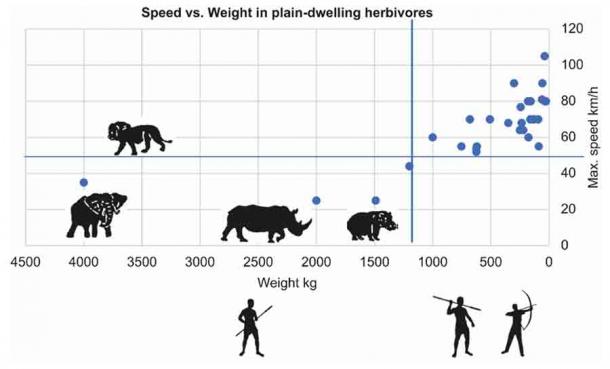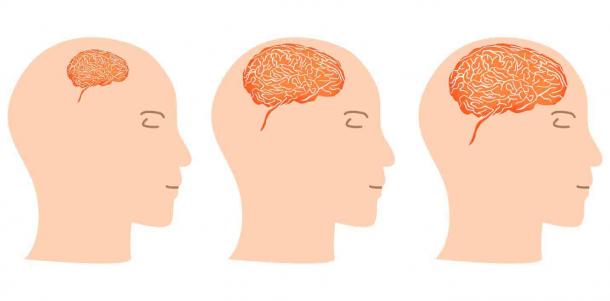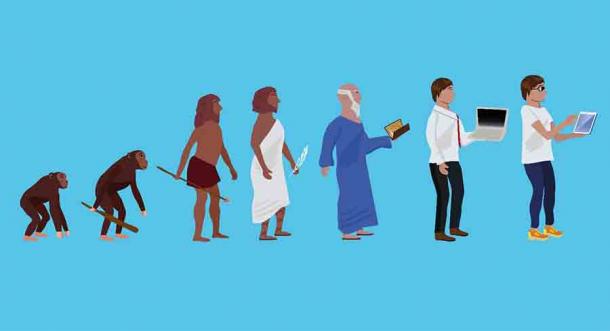Two researchers from the archaeological department at Israel’s Tel Aviv University have come up with an all-inclusive theory to explain the physiological and historical development of human brain development. Paleoanthropologist Miki Ben-Dor and prehistoric archaeologist Ran Barkai assert that changes in human food collecting practices, and the environmental changes that precipitated them, played a major determining role of the gradual evolution of human brain development resulting in advanced cognitive abilities, endowed with enough self-awareness and analytical insight to reflect on its own capacities and origin.

This figure shows that most big prey animals were heavy and slow and thus easy for humans to hunt. When big mammals went extinct, human brain development accelerated so that we could easily hunt smaller prey with spears and arrows. ( MDPI)
How Less Or Zero Big Prey Sparked Human Brain Development
According to the scientists’ thesis , when early humans hunted the large animals they depended on for food into extinction, it toppled the first evolutionary domino.
At the time humans first appear in the fossil record (circa two million BC), the average size of land mammals was approximately 1100 pounds (500 kilograms). The earth was overrun with hulking creatures that were slow and easy to find, which meant the first human hunters didn’t have to travel very far or work very hard to keep their social groups well-fed.
Unfortunately for proto-man, the hunting was a little too easy, and over time an expanding human population pushed most of their large prey animals over the cliff into extinction.
As the availability of large prey dwindled, early humans faced a stark but simple choice: adapt or die.
Naturally, they did their best to do the former. They switched their focus from larger prey to smaller prey, which was still available in abundance.
Fortunately for them and posterity (us), their efforts to adapt got a big boost from nature, through its ceaseless capacity to produce genetic variations or mutations that allow living creatures to evolve in a favorable, survival-oriented direction.
As the animals early humans were able to hunt got smaller (the average size of land mammals shrunk by 90 percent between two million BC and the dawning of the agricultural revolution in 10,000 BC), human cognitive activity was challenged as never before. This placed what Ben-Dor and Barkai refer to as “prolonged evolutionary pressure ” on the human brain, which led to a general growth in human intelligence and an accompanying expansion in brain size.

Between 2 million BC and 300,000 BC the human brain expanded from 650 to 1,500 cubic centimeters, a more than 200% increase. ( Jimmyi23 / Adobe Stock)
While correlation does not prove causation, it is an undeniable fact that as land mammals got progressively smaller the human brain got progressively bigger. The cranial capacity of early humans (circa two million BC) was only 650 cubic centimeters (cc), but by 300,000 BC it had expanded to an impressive 1500 cc, which represents a more than 200 percent increase.
Meanwhile, the most precipitous declines in land mammal size occurred in regions occupied by early humans, which made it easy for Ben-Dor and Barkai to connect the dots.
“We correlate the increase in human brain volume with the need to become smarter hunters,” Ben-Dor explained . Humans seeking smaller prey “were now using up much more energy in both movement and thought processes. Hunting small animals, that are constantly threatened by predators and therefore very quick to take flight, requires a physiology adapted to the chase as well as more sophisticated hunting tools. Cognitive activity also rises as fast tracking requires fast decision-making, based on phenomenal acquaintance with the animals’ behavior – information that needs to be stored in a larger memory.”
Humans developed better hunting strategies and more effective hunting tools (like the bow and arrow) over the course of the next several hundred thousand years, in part because they were forced to innovate and in part because their cognitive abilities were improving as their brains increased in size and complexity.
During this time, they also discovered fire ( and learned how to control it ), were able to domesticate dogs for use as hunting companions, and most significantly they developed the first languages, all of which offered them tremendous advantages in the ongoing struggle for individual (and species) survival.
Once again, however, humans proved too clever and adaptable for their own good. With their giant 1500 cc brains functioning at full-throttle, they continuously outsmarted and out-strategized their smaller prey, until they pushed those animals to the edge of extinction as well.

Human beings have definitely evolved but can human brain development make another leap forward to deal with climate change and new forms of evolutionary pressure? ( sashazerg / Adobe Stock)
To Deal With Climate Change, Could Our Brains Develop Again?
When the law of diminishing returns rendered the hunting lifestyle unsustainable, it created the pre-conditions for the Agricultural Revolution , which changed human subsistence practices, and humanity’s relationship to the natural world, forever.
Without the expansion of cognitive abilities humans had experienced over the previous two million years, they wouldn’t have been observant enough, perceptive enough, or flexible enough to make a successful shift to animal and crop domestication. It seems the Neanderthals couldn’t adapt to changing conditions in this way and went extinct as a result.
Interestingly, the human brain has now shrunk slightly in size, from its peak at 1500 cc to 1300-1400 cc today. The settled and relatively sustainable lifestyle associated with agriculture has relieved some of the evolutionary pressure that Ben-Dor and Barkai identified, and it would seem human brains have shed some excess as a result.
But yet again, our immense cleverness and inventiveness has brought us to the precipice of a mass extinction. Nature is melting down from the impact of highly-extractive and unsustainable human activities practiced on a global scale, and unless we make major adjustments in our lifestyles a sixth great extinction may be unavoidable—and this time, it may take us with it.
Given the severity of our plight, could another dramatic expansion in our cognitive capacities be in the offing? Will “prolonged evolutionary pressures” caused by changing environmental circumstances spark another round of evolution in human brain development?
If we had enough time to produce multiple new generations, perhaps they could. Unfortunately, the pace of environmental collapse may be too rapid this time for evolutionary human brain development to work its magic.
Top image: Cave painting of a primitive hunt at a time when big prey animals were still plentiful. Human brain development increased when there were much fewer easy-to-hunt big mammals or none at all. Source: Nomad_Soul / Adobe Stock
By Nathan Falde
Related posts:
Views: 0
 RSS Feed
RSS Feed

















 March 3rd, 2021
March 3rd, 2021  Awake Goy
Awake Goy  Posted in
Posted in  Tags:
Tags: 
















